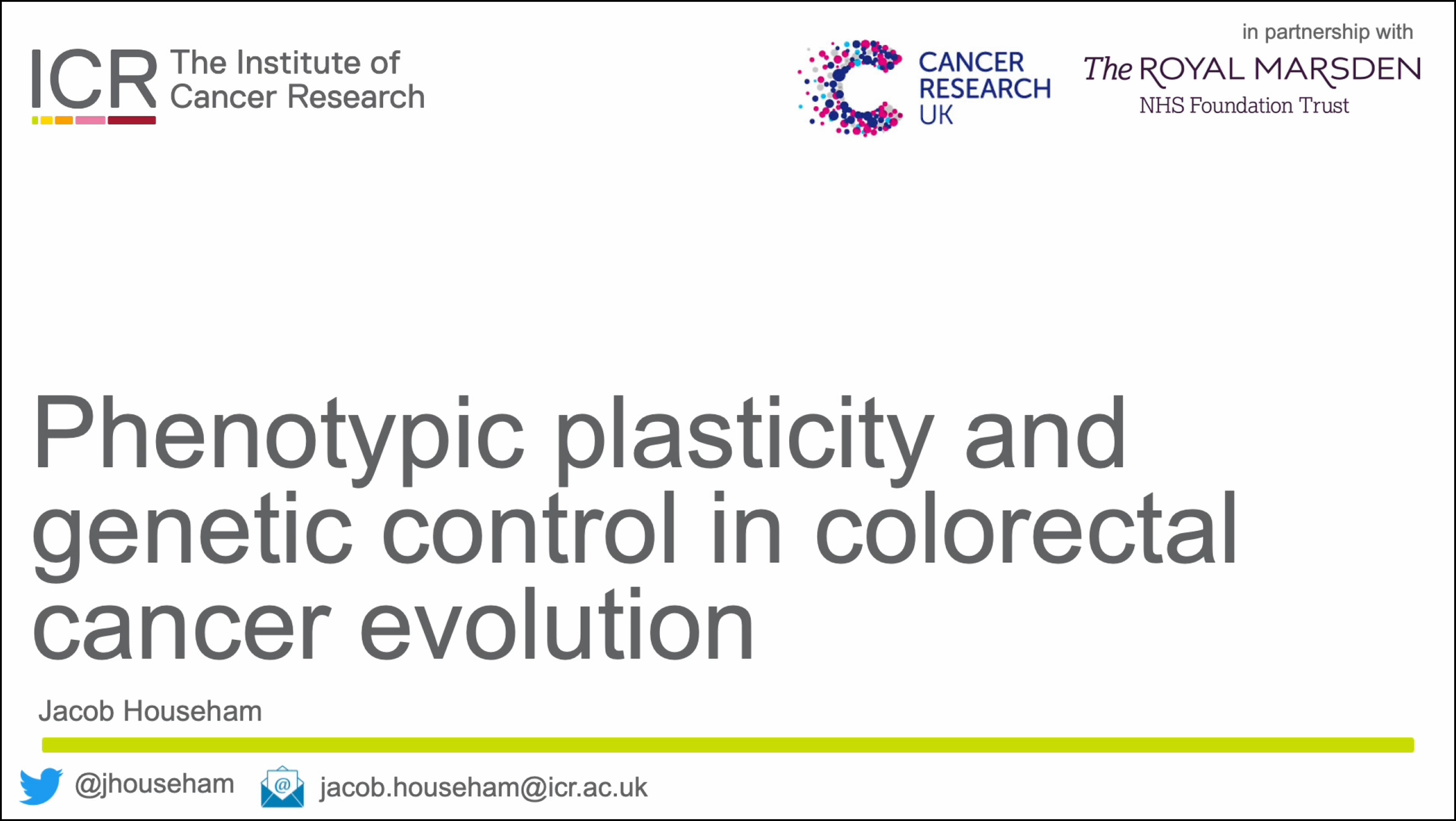Phenotypic plasticity and genetic control in colorectal cancer evolution
Jacob Househam1,2, Timon Heide1,3, George D Cresswell1, Inmaculada Spiteri1, Chris Kimberley2, Luis Zapata1, Claire Lynn1, Chela James1, Maximilian Mossner1,2, Javier Fernandez-Mateos1, Alessandro Vinceti3, Ann-Marie Baker1,2, Calum Gabbutt1,2, Alison Berner2, Melissa Schmidt2, Bingjie Chen1, Eszter Lakatos1,2, Vinaya Gunasri1,2, Daniel Nichol1, Helena Costa4, Miriam Mitchinson5, Daniele Ramazzotti6, Benjamin Werner2, Francesco Iorio3, Marnix Jansen4, Giulio Caravagna1,7, Chris P Barnes8, Darryl Shibata9, John Bridgewater4, Manuel Rodriguez-Justo4, Luca Magnani10, Andrea Sottoriva11,12, Trevor A Graham13,14
- Centre for Evolution and Cancer, The Institute of Cancer Research, London, UK.
- Centre for Genomics and Computational Biology, Barts Cancer Institute, Queen Mary University of London, London, UK.
- Computational Biology Research Centre, Human Technopole, Milan, Italy.
- UCL Cancer Institute, University College London, London, UK.
- Histopathology Department, University College London Hospitals NHS Foundation Trust, London, UK.
- Department of Medicine and Surgery, University of Milano-Bicocca, Milan, Italy.
- Department of Mathematics and Geosciences, University of Trieste, Trieste, Italy.
- Department of Cell and Developmental Biology, University College London, London, UK.
- Department of Pathology, University of Southern California Keck School of Medicine, Los Angeles, CA, USA.
- Department of Surgery and Cancer, Imperial College London, London, UK.
- Centre for Evolution and Cancer, The Institute of Cancer Research, London, UK. andrea.sottoriva@fht.org.
- Computational Biology Research Centre, Human Technopole, Milan, Italy. andrea.sottoriva@fht.org.
- Centre for Evolution and Cancer, The Institute of Cancer Research, London, UK. trevor.graham@icr.ac.uk.
- Centre for Genomics and Computational Biology, Barts Cancer Institute, Queen Mary University of London, London, UK. trevor.graham@icr.ac.uk.
Abstract
Genetic and epigenetic variation, together with transcriptional plasticity, contribute to intratumour heterogeneity1. The interplay of these biological processes and their respective contributions to tumour evolution remain unknown. Here we show that intratumour genetic ancestry only infrequently affects gene expression traits and subclonal evolution in colorectal cancer (CRC). Using spatially resolved paired whole-genome and transcriptome sequencing, we find that the majority of intratumour variation in gene expression is not strongly heritable but rather 'plastic'. Somatic expression quantitative trait loci analysis identified a number of putative genetic controls of expression by cis-acting coding and non-coding mutations, the majority of which were clonal within a tumour, alongside frequent structural alterations. Consistently, computational inference on the spatial patterning of tumour phylogenies finds that a considerable proportion of CRCs did not show evidence of subclonal selection, with only a subset of putative genetic drivers associated with subclone expansions. Spatial intermixing of clones is common, with some tumours growing exponentially and others only at the periphery. Together, our data suggest that most genetic intratumour variation in CRC has no major phenotypic consequence and that transcriptional plasticity is, instead, widespread within a tumour.
Presented By Jacob Househam | ORCID iD

